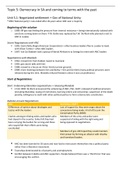Unit 5.1: Negotiated settlement + Gov of National Unity
*1994: National party’s rule ended after 46 years when ANC won a majority
Beginning of the solution
o 1989: NP gov was feeling the pressure from internal resistance + being internationally isolated with
sanctions coming down on them. P.W. Botha was replaced by F.W. De Klerk who planned a visit to
ANC in Lusaka.
Secret Negotiations with ANC
▪ 1985: Gavin Rally (Anglo-American Corporation) + other business leaders flee to Lusaka to meet
with Oliver Tambo + other ANC leaders
▪ 1987: Van Zyl Slabbert took a group of liberal Afrikaners to Senegal to meet with ANC leaders
Negotiations with Mandela
▪ 1982: moved him from Robben Island to mainland
▪ 1985: gov secret talks with him
▪ 1988: moved to a house on Victor Verster prison grounds
▪ 1989: more meetings between him and Botha + him and De Klerk (many political prisoners were
released during this time. Mandela refused freedom unless it was unconditional.)
Start of Negotiations
Start: Unbanning liberation organizations + releasing Mandela
▪ 2 Feb 1990: De Klerk announced the unbanning of ANC, PAC, SACP; released of political prisoners
(including Mandela); easing of restrictions, banning orders and censorship; suspension of the death
penalty; willingness to work with other political parties to form a democratic constitution.
Debates around Negotiations
ANC NATIONAL PARTY
Differences of opinion about ideologies and Loss of support bc they were angry about the
tactics with the leaders concessions being made. A lot left to join the
Conservative Party (AWB)
Clashes amongst refuting exiles and leaders who Members of the army and police were
had stayed in the country. Exiles felt they had suspected of siding with the right-wing and
been carrying the burden for so long and those being opposed to negotiations.
who stayed felt their efforts were being
overlooked
Members of gov still hoped they could maintain
their power by forming an alliance with Inkatha
and homeland leaders.
▪ ANC has been banned for 30 years and now had to restructure themselves into a political party
rather than a liberation movement.
▪ Townships deteriorated bc of poverty and unemployment.
▪ Conflict between Inkatha and ANC supporters. People believed there was a ‘third force’ that was
encouraging this conflict.
, ▪ Third force: a group of army and police who were suspected of stirring up violence between Inkatha
and ANC supporters.
▪ First round of negotiations was cancelled & NP made concessions:
1. A judicial commission was going to investigate the Sebokeng killings
2. Troops were sent to Natal to keep order
3. ANC exiles involved in negotiations were kept from being prosecuted temporarily.
Groote Schuur Minute
▪ May 1990: @ Groote Schuur (Pres. House) – 3-day meeting
▪ Discussed security legislation, troops in townships, state of emergency, violence, position of
homelands, political prisoners, armed struggle, economic sanctions, return of exiles.
▪ Disagreed about who should be considered a criminal vs a political prisoner
Pretoria Minute
▪ August 1990: ANC gives up armed struggle and NP ends the state of emergency
▪ People found out that the gov was secretly funding the Inkatha’s feud with ANC.
▪ Each side had diff views about the constitution:
1. ANC wanted a majority rule under a constituency that was drawn up by an elected body
2. The gov wanted ‘power-sharing’ to protect white economic power so the NP still had a leading
role.
CODESA
▪ Dec 1991: Convention for a Democratic South Africa @ World Trade Centre in Kempton Park until
May 1992. 300 delegates where 19 diff groups were represented (multiparty conference).
Conservative Party, PAC and AZAPO boycotted.
▪ Compromise about the constitution:
1. A multi-party conference would draw up an interim constitution
2. The first elected parliament would use that as a base model for the final one
▪ Continued discussions on:
1. Principles for a new constitution
2. Interim gov
3. Future of homelands
4. Timeline for changes
Role of the labor movement in negotiations
▪ COSATU joined the ANC and SACP to form the Tripartite Alliance bc COSATU couldn’t take place in
Negotiations since they weren’t a political party (they went as delegates).
▪ COSATU was NB in planning and maintaining the “rolling mass action”. They also suggested features
that would be used in the constitution (proportional representation = seats in parliament were
allocated based on the proportion of votes). They also wanted to make sure that a plan was in place
to address all the economic issues and the Reconstruction and Development Programme was
drafted by the Tripartite Alliance.
Breakdown of Negotiations
Whites only referendum
▪ Conservative white voters were angry that things were changing and they worried about the on-
going violence, return of political exiles and having SACP leaders participate in negotiations. They
were worried that the NP was going to hang them out to dry and so they moved towards the
Conservative Party or to the AWB to protect their interests,




